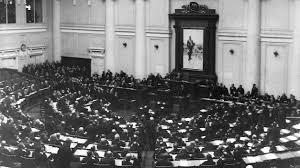The State Duma is the lower house of the Federal Assembly of Russia, the country’s bicameral parliament. Established in 1993, the Duma plays a crucial role in the Russian political system.
Key Roles and Functions
- Legislative Power: The Duma is responsible for enacting federal laws, including the state budget, tax laws, and social legislation.
- Oversight: The Duma oversees the activities of the government, including the executive branch and other state bodies.
- Appointment and Dismissal: The Duma has the power to appoint and dismiss certain high-ranking officials, such as the Central Bank Governor and the Prosecutor General.
- Declaration of Amnesty: The Duma can declare amnesty for certain categories of crimes.
- International Relations: The Duma participates in international parliamentary cooperation, fostering diplomatic relations with other countries.
Composition and Election
The State Duma consists of 450 deputies, elected for a five-year term. Elections are held through a mixed-member proportional representation system, combining direct elections in single-member constituencies with party-list voting. This system ensures a balance between representation of specific regions and political parties.
Current Political Landscape
In recent years, the United Russia party, led by Vladimir Putin, has dominated the State Duma. While other parties are represented, their influence is limited. The Duma is often criticized for its lack of independence and its role as a rubber-stamp for the executive branch.
Challenges and Future Outlook
The State Duma faces several challenges, including:
- Lack of Independence: The Duma is often seen as a tool of the executive branch, lacking the autonomy to effectively represent the interests of the people.
- Low Public Trust: Public trust in the Duma has declined due to perceived corruption and lack of accountability.
- Limited Impact on Policy-Making: The real decision-making power often lies with the President and the executive branch.
Despite these challenges, the State Duma remains an important institution in the Russian political system. Its role in shaping legislation, overseeing the government, and representing the interests of the people is crucial. As Russia continues to evolve, the State Duma will need to adapt to changing political and social realities to remain relevant and effective.

Leave a Reply